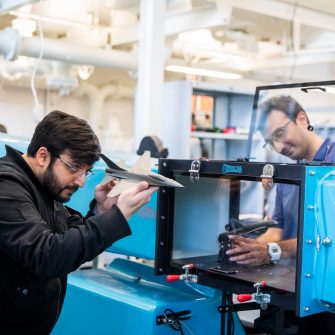Bachelor of Engineering (Honours) / Science
- Commencing Terms
- Term 1, 2 & 3
- Duration
- 5 Year(s)
- Delivery Mode
- Face-to-face (includes blended)
- Campus
-
Kensington
- Codes
- UAC code 425850
- Program code 3767
-
2025 Indicative first year full fee
- $8,000*
-
2025 Indicative full fee to complete degree
- $46,000*
-
2025 Indicative first year full fee
- $58,500*
-
2025 Indicative full fee to complete degree
- $324,500*
- Overview
- Entry requirements
- What will I study?
- Future careers
- How to apply
- Fees & Scholarships
Overview
Engineering and science are two of the most crucial knowledge areas for building a better world. Combine the two in this globally-recognised double degree and unlock the skills to take on the jobs of tomorrow.
In the Engineering (Honours) degree, you’ll study at Australia’s leading Engineering faculty. We're ranked #1 in Australia and #25 globally for Engineering and Technology. As well as this, all of UNSW's Engineering schools are ranked in the global top 50 with two schools ranked in the global top 10 for Engineering subjects (QS World University Rankings by Subject, 2025).
Be immersed in cutting-edge technology and enjoy hands-on learning experiences. You'll apply yourself to engineering design, problem-solving, research projects, professional engineering practice and technical management across 18 engineering disciplines.
As part of the Science degree, you’ll learn how to apply your expertise to real-world challenges across a wide range of industries. With 27 majors on offer, including biology and biodiversity, chemistry, neuroscience, mathematics and physics, you’ll build your degree around your passions.
Key features
- Build a degree around your passions and aspirations
University is a time to discover your interests and explore the wide range of opportunities waiting for you after graduation. This double degree allows you to carve out your own unique skill set across science and engineering.
In Engineering (Honours), 18 specialisations are on offer, including Civil, Mechanical and Electrical Engineering, and emerging areas like Quantum Engineering or Renewable Energy Engineering. In the Bachelor of Science, our flexible degree structure means you can study a single major, double major or choose from 39 complementary minors across a range of disciplines. The choice is yours!
- Double your employability and multiply your opportunities
Combine your interests and gain a competitive advantage in the graduate job market with this globally-recognised double degree. By approaching your studies with the added perspective of a second discipline, you’ll develop a richer understanding of your subject matter and graduate with a specialised skill set that will set you apart.
Despite the name, a double degree doesn’t mean double the time or workload. By combining the Bachelor of Science and Bachelor of Engineering (Honours) into a double degree, you’ll study focused courses in each program, allowing you to complete the two degrees faster.
- Explore your career possibilities through research and work integrated learning
Take advantage of our Work Integrated Learning (WIL) opportunities to explore potential career paths. On the Engineering side, you’ll undertake 60 days of Industrial Training in order to qualify for accreditation by Engineers Australia (EA). You’ll explore different careers, apply classroom theory to real-life situations and ensure you’re work-ready before graduation.
In Science, you’ll apply your knowledge in a real-world context from year one, and in years two and three, you’ll choose from a range of employability experience courses, including work placements, industry projects or Research Integrated Learning (RIL).
Why study this degree at UNSW?
Entry requirements
Assumed knowledge
Mathematics Advanced or Mathematics Extension 1 (depending on chosen area of study) plus one or more of Biology, Chemistry, Earth and Environmental Science, Physics.
Adjustment Factors
We offer a range of adjustment factor schemes that reward students for academic performance and extra-curricular achievements. These schemes also take into account a range of personal and educational disadvantages that may have affected your studies.
HSC Plus
This scheme rewards students who perform well in Year 12 subjects that are relevant to their preferred UNSW degree. You may be awarded up to five points.
Elite Athletes, Performers and Leaders (EAPL)
This program recognises achievements in the areas of sport, academia, leadership and music at an elite level. You may be eligible for up to five points.
Educational Access Scheme (EAS), opens in a new window
Factors such as illness, financial hardship, language difficulties or attending a particular school can mean you don't always get the best possible marks in Years 11 and 12. If one of these situations applies to you, submit an application for the Educational Access Scheme (EAS) via UAC. Eligible students can receive between 1 and 10 points towards their chosen UNSW degree.
Admission pathways
Your ATAR is not the only measure of your potential to succeed, which is why we offer a range of pathways into university. Explore your options below and get in touch with our Future Student Advisers to discuss your path to UNSW.
Gateway Admission Pathway
This scheme is open to students who attend Gateway schools, live in a low-socioeconomic area based on IRSAD and IEO indexes of SEIFA criteria, or are an Aboriginal and Torres Strait Islander person. It adjusts the ATAR requirements for your preferred UNSW degree and provides early offers and early conditional offers to UNSW.
Entry programs for Australian Aboriginal and Torres Strait Islander people
We offer entry programs for Indigenous Australians, including the Indigenous Preparatory Programs and the Indigenous Admission Scheme (IAS). The entry pathway program you apply for will depend on the degree you want to study.
This degree is eligible for admission through our Portfolio Entry Early Conditional Offer Scheme. Complete a submission to demonstrate your passion and performance in relevant subjects. Successful applicants will receive an early conditional offer with an adjusted ATAR entry requirement.
English language requirements
You may be asked to provide evidence of your English proficiency to study at UNSW depending on your educational background and citizenship. English language skills are vitally important for coping with lectures, tutorials, assignments and examinations - this is why UNSW requires a minimum English language competency for enrolment.
If you’re completing an Australian Year 12 qualification (e.g. NSW HSC or equivalent), you do not need to provide anything extra to prove your proficiency. Your qualification will be used as evidence of your English proficiency.
If you do need to provide evidence of your English proficiency, this will be indicated in your application. You can prove this by providing evidence that you meet one or more of the following criteria:
- English language tests and university English courses
- Prior study in the medium of English
- Other qualifications
If you need to improve your English skills before you start your degree, UNSW College’s Academic English Programs are for you. The programs are suitable for various English levels and help you prepare for university studies and life in Australia.
For more details, visit the English Language Requirements page.
International direct entry
| Qualifications | Direct entry requirement |
|---|---|
|
International ATAR
|
85.0
|
| UNSW Foundation Studies GPA |
7.5
|
|
Great Britain General Certificate of Education (GCE A levels)
|
11.0
|
|
International Baccalaureate Diploma (IB)
|
32.0
|
|
Scholastic Aptitude Test (SAT) (after 2016)
|
1210.0
|
We do not accept secondary qualifications from this country. We may accept tertiary study results, please contact us for more information.
Please contact us for direct entry requirements.
Admission pathways
If you do not meet the requirements for direct entry into your chosen degree, you may be eligible for a pathway program with UNSW College. UNSW College provides alternative entry options using university-approved content so that you can start your UNSW journey with confidence.
English language requirements
You may be asked to provide evidence of your English proficiency to study at UNSW depending on whether you are from an English-speaking background or non-English speaking background. English language skills are vitally important for coping with lectures, tutorials, assignments and examinations - this is why UNSW requires a minimum English language competency for enrolment.
If English is not your first language, you’ll need to provide proof of your English proficiency before you can be given an offer to study at UNSW. You can do this by providing evidence that you meet one or more of the following criteria:
- English language tests and university English courses
- Prior study in the medium of English
- Other qualifications
If you need to improve your English skills before you start your degree, UNSW College’s Academic English Programs are for you. The programs are suitable for various English levels and help you prepare for university studies and life in Australia.
For more details, visit the English Language Requirements page.
Check the specific English language requirements for this program
Program structure
The Bachelor of Engineering (Honours)/Bachelor of Science is a double degree that you can complete in five years with full-time study. You’ll complete 240 units of credit (UOC) through a combination of core courses, electives, majors and minors.
Be empowered to lead your learning with SciConnect
SciConnect is an innovative online system that's integrated across your whole science degree. It will be there to help you settle into university, track your professional development and showcase your skills to future employers. The platform focuses on connecting you with four key areas to help you get the most out of your student experience including orientation, co-curricular opportunities and communities, career development and a graduate portfolio.
SciConnect enables you to shape your university experience and supports you in showcasing your talents to potential employers with a comprehensive impression of who you are, beyond your academic transcript.
Full program structure
Your double degree consists of:
- 168 units of credit from Engineering (Honours), including:
- One of 18 majors
- 60 days of Industrial Training
- At least 48 UOC Disciplinary Knowledge and Enquiry-based Courses
- 30-42 UOC Introductory Knowledge core courses
- At least 12 UOC of elective courses
- 96 units of credit from Science, including:
- Five core courses (orientation, graduate portfolio and three employability experience courses)
- One approved Science major
- An optional minor
- Science elective courses (if required)
Majors
Future careers
Studying Science and Engineering as a dual degree at UNSW will unlock a world of possibilities upon graduation. You’ll gain transferable skills that can be applied across a variety of industries and functions. Your core logical, analytical and critical thinking skills will be an asset to any organisation, and through your chosen specialisation, you’ll be armed with the knowledge to solve real-world problems.
As part of the Engineering (Honours) program, you’ll graduate with the technical knowledge, skills and attributes required to succeed as a professional engineer. Depending on your specialisation, you can combine your scientific expertise to transform the engineering profession across civil, environmental, computer science and more. You’ll also be eligible to apply for membership to Engineers Australia – the peak body for the engineering profession in Australia.
The Bachelor of Science will prepare you to lead the next wave of scientific discovery. You can work in areas as diverse as medical research, public policy, forensic science, patent law, science education and optics.
Explore our study areas below to discover the range of potential career paths available across the fields of science and engineering.
Accreditation
This degree is accredited by Engineers Australia. The Quantum Engineering stream is provisionally accredited by Engineers Australia.
This degree with majors in Bioinformatics, Computer Engineering and Software Engineering is also accredited by the Australian Computing Society.
How to apply
Applications for undergraduate study from domestic students (Australian citizens, Australian permanent residents, Australian permanent humanitarian visa holders and New Zealand citizens) are processed by the Universities Admissions Centre (UAC).
Visit the Apply section of the UAC website, opens in a new window and you can nominate up to five degrees in order of preference, with the first being your most desired degree and university.
On-time applications for admission usually close at the end of September each year for Term 1 admission. Late applications can be submitted, but a late fee will apply. For study starting in Term 1, the majority of offers are made in December and January. Visit the UAC website, opens in a new window for key dates for admission outside of Term 1.
Ready to apply?
For most international students, applications are submitted via our Apply Online service. We encourage you to submit your completed application as early as possible to ensure it will be processed in time for your preferred term.
Some high-demand programs with limited places, may have an earlier application deadline or may have an earlier commencement date. For more information visit our international applicant information page.
*If you are an international student studying an Australian qualification, go to the Universities Admission Centre (UAC), opens in a new window for application and UAC key dates. Note: If you are under 18 years of age, you need to make special arrangements. Read more.
Ready to apply?
Fees & Scholarships
Commonwealth Supported Place: Student Contribution Band 2
*The student contribution for a Commonwealth Supported Place is an indication only of the amount payable in Year 1 based on a standard full-time load of 48 credit points (1.0 EFTSL). The actual student contribution you will be liable for depends on your individual program of study and the calendar year in which you enrol. Actual fees are calculated upon enrolment. Student contribution amounts are subject to annual review by the university and may increase each year during your studies (subject to caps determined by the Australian Government), effective at the start of each calendar year.
The indicative fees listed here are based on an estimated average and are for tuition only - other fees and charges are not included.
*Fees are subject to annual review by the University and may increase annually, with the new fees effective from the start of each calendar year. The indicative fees listed here are based on an estimated average and are for tuition only, other fees and charges are not included. The amount you pay will vary depending on the calendar year to enrol, the courses you select and whether your study load is more or less than 1 Equivalent Full Time Student Load (8 courses per year).
Indicative fees are a guide for comparison only based on current conditions and available data. You should not rely on indicative fees. More information on fees can be found at the UNSW fees website.
Indicative fees to complete the program have been calculated based on a percentage increase for every year of the program. Fee increases are assessed annually and may exceed the indicative figures listed here.
Indicative fees to complete the program include tuition plus an estimate of study-related costs of approximately $1,000 per year. To find out more about other costs, visit UNSW International.
Scholarships
At UNSW, we award over $83 million in scholarships each year. We pride ourselves on rewarding excellence and making university accessible to students from all walks of life. Whether you’re a domestic or international student, our range of scholarships, prizes and awards can support your journey.

QS World University Rankings, 2025

AFR Top100 Future Leaders Awards, 2020-2025

#1 Australian uni attended by start-up founders











